小学英语单词和语法大全
小学英语单词分类+语法时态汇总(附练习题)

1. 动物:cat猫dog狗pig猪duck鸭rabbit兔子horse马elephant大象ant蚂蚁sheep羊donkey驴squirrel松鼠fish鱼bird鸟eagle鹰snake蛇mouse老鼠kangaroo袋鼠goose鹅monkey猴子panda熊猫bear熊lion狮子tiger老虎fox狐狸zebra斑马giraffe长颈鹿rooster 公鸡lion狮子zebra斑马swan天鹅hen母鸡cow牛dragon龙2.水果蔬菜:mango芒果apple苹果banana香蕉pear梨orange桔子watermelon西瓜grape葡萄peach桃子strawberries草莓lemon柠檬tomato西红柿potato土豆onion洋葱carrot胡萝卜eggplant茄子greenbean青豆cucumber黄瓜cabbage卷心菜3.食物:fish 鱼noodles面条cake 蛋糕tofu豆腐nut 坚果meat 肉beef 牛肉pork猪肉sandwich三明治vegetable 蔬菜rice 米饭biscuits饼干egg 鸡蛋hotdog热狗sausage香肠jam 果酱sweet potato 白薯milk 牛奶cherrypie 樱桃派onion 洋葱chicken鸡肉oil 油pizza 披萨yogurt 酸奶chocolate巧克力porkribs排骨ice cream冰激凌sweetand sour fish糖醋鱼bread面包meatballs肉丸子chickennuggets炸鸡块fruit 水果a bowl ofsoup 一碗汤cookies 曲奇a dish 一道菜salad沙拉greenbean青豆dessert 甜点ketchup番茄沙司hamburger汉堡French fries 炸薯条4. 饮料:coffee咖啡coke可乐juice果汁milk牛奶water水orangejuice橙汁beer啤酒tea茶5. 交通工具:bike自行车bus公共汽车train火车boat小船ship轮船yacht快艇car小汽车jeep吉普车plane飞机subway地铁taxi出租车spaceship宇宙飞船6.颜色:red红色blue蓝色yellow黄色orange橘色green绿色pink粉色black黑色white白色brown棕色grey灰色purple紫色silver银色7. 学习用品:computer电脑knife小刀pen钢笔pencil铅笔pencil-case铅笔盒pencil-box铅笔盒ruler尺子book书bag书包newspaper报纸schoolbag书包eraser橡皮math book数学书sharpener转笔刀storybook故事书notebook笔记本English book英语书crayon蜡笔Chinesebook语文书8. Family Tree家庭成员之间的关系mother母亲father父亲sister姐妹brother兄弟son儿子daughter女儿uncle叔叔aunt阿姨dad爸爸mom妈妈grandfather祖父grandmother祖母grandpa爷爷grandma奶奶cousin堂兄弟姐妹nephew侄子niece侄女9. 用来形容某人的词汇:“He is kind.”(他是善良的。
小学英语语法知识 I、my、you、your、he、him、she、her、they、them、it、its各种区别用法

小学英语语法知识英语 I, my, me, mine的用法:1、I, 代词, 一般做主语, 意思是“我”;用法, 通常作为主语放在句首, 后加动词(包括Be);例: I am a good person. -- 我是一个好人2、me, 代词, 一般做宾语, 意思也是“我”;用法, 通常作为宾语放在句尾, 放在在动词后面;例: Don't hit me. -- 别打我。
3、my, I的所有格形式, 形容词性物主代词,翻译为“我的”;用法, 跟一般形容词一样, 后面加名词;例: He is my brother. -- 他是我的兄弟。
4、mine, I的所有格形式, 代词, 翻译为“我的(东西)”;用法, 可做主语,宾语等等,例: He's a friend of mine (= one of my friends) . -- 他是我的一个朋友。
英语 you、your、yours 有什么区别?1、you 指“你”。
your 指“你的,你们的”you可以直接放在句首做主语,而 your 不能单独使用,必须加上名词使用。
如:you are interesting. 你有趣。
(you直接做主语)your book is interesting. 你的书有趣。
(注意这里your book 才是主语)you可以直接做宾语,而your不可以,必须加上名词使用。
(可以和上面一条比较,只是位置不一样)如:I like you.我喜欢你。
I like your book.我喜欢你的书。
your 你的,你们的yours你的(东西),你们的(东西)your 是形容词性物主代词,后接名词yours名词性物主代词,后面不接名词,相当:your+名词据个例子你就明白了:this is my book and thatis your book.this is my book and that is yours.英语he、him、his有什么区别?首先他们都是代词,但是he是主格人称代词;him是宾格人称代词;his是形容词性的物主代词,他们运用在一个句子的不同地方。
北京市小学英语重点单词和语法

北京市小学英语重点单词和语法1. 重点单词:1.1. 名词 (Nouns):- Beijing (北京): The capital city of China.- school (学校): An institution where students go to receive education.- student (学生): A person who attends school or college.- teacher (老师): A person who teaches in a school or college.- book (书): A written or printed work consisting of pages glued or sewn together along one side and bound in covers.- pencil (铅笔): A thin cylindrical instrument used for writing or drawing, consisting of a narrow rod encased in wood.- desk (桌子): A piece of furniture with a flat or sloping surface and typically with drawers, at which one can read, write, or do other work.- chair (椅子): A separate seat for one person, typically with a back and four legs.- blackboard (黑板): A large flat surface, typically of dark slate or painted wood, used for writing or drawing on with chalk.- computer (计算机): An electronic device that can store, retrieve, and process data.- keyboard (键盘): An arrangement of typewriter keys or a similar set of keys on a computer or other electronic device for inputting text, numbers, or commands.- mouse (鼠标): A small device that is moved across a flat surface to control the movement of a pointer on a computer screen.- classroom (教室): A room in which a class of pupils or students is taught. - library (图书馆): A building or room containing collections of books, periodicals and sometimes films and recorded music for use or borrowing by the public or the members of an institution.- homework (家庭作业): Tasks or exercises set by a teacher for a student to do in their own time.- examination (考试): An official test of knowledge, skill, or ability, typically taken by students as part of an educational course.- certificate (证书): A document issued by an educational institution, employer, or other organization to attest that a person has achieved a certain level of knowledge, skill, or qualification.- diploma (文凭): A certificate or title awarded by a university, college, or other educational institution as a qualification or a mark of achievement.- playground (操场): An area where children can play, usually outside a school or home.- sport (运动): Physical activity that is enjoyable and involves competitionor movement, such as running, swimming, or playing a game.- team (团队): A group of people working together towards a common goal or objective.1.2. 动词 (Verbs):- study (学习): To acquire knowledge, as by reading, investigation, or reflection.- learn (学习): To gain or acquire knowledge of or skill in (something)through study, experience, or being taught.- teach (教): To impart knowledge or skill to someone through instruction or example.- read (阅读): To look at and comprehend the meaning of (written or printed matter) by mentally interpreting the characters or symbols of which it is composed.- write (写): To mark (letters, words, or other symbols) on a surface,typically paper, with a pen, pencil, or similar implement.- draw (画): To produce (a picture or diagram) by making lines and marks, especially with a pen or pencil, on paper.- listen (听): To give one's attention to a sound.- speak (说话): To utter words or articulate sounds with the ordinary voice.- sit (坐): To rest with the body supported by the buttocks or thighs; be seated.- stand (站立): To be in an upright position on the feet.- jump (跳): To move or leap into the air with a sudden upward movement of the body.- run (跑): To move at a fast pace, typically by moving the legs alternatelyoff the ground.- walk (走): To move on foot at a regular pace, especially across country or across town.- swim (游泳): To move through water propelling oneself with the arms and legs. - play (玩): To engage in activity for enjoyment and recreation rather than a serious or practical purpose.- laugh (笑): To express the feeling of pleasure or satisfaction by an audible sound consisting of a series of short, sharp breaths.- cry (哭): To express a strong feeling, such as pain, sorrow, or anger, by shedding tears and often by sobbing.- eat (吃): To take solid food into the mouth and chew it.- sleep (睡觉): To spend a period of time in a state of unconsciousness, typically for periods of six to eight hours per day, during which the body and brain rejuvenate.- dream (梦): To experience a succession of images, ideas, emotions, and sensations during sleep.- hope (希望): To desire with the expectation of obtaining something or of achieving a certain goal.- believe (相信): To have a firm conviction or acceptance of the truth or existence of something.- think (想): To have or form an idea or opinion about something.1.3. 形容词 (Adjectives):- big (大): Of considerable size, extent, or intensity.- small (小): Of a size that is less than normal or usual.- happy (高兴): Feeling or showing pleasure or contentment.- sad (伤心): Feeling or showing sorrow; unhappy.- beautiful (美丽): Pleasing the senses or mind aesthetically.- ugly (丑陋): Unpleasant or repulsive, especially in appearance.- smart (聪明): Having or showing quick intelligence or ready mental capability.- kind (善良): Having or showing a friendly, generous, and considerate nature. - hardworking (努力工作): Tending to work with energy and commitment; diligent. - funny (有趣的): Causing laughter or amusement.- brave (勇敢): Not deterred by danger or pain; bold.- lazy (懒惰): Unwilling to work or use energy.- helpful (乐于助人): Willing to give assistance or support.- friendly (友好): Showing warmth and politeness towards others.- mean (刻薄的): Unkind and willing to harm others for personal gain.- healthy (健康): In good physical condition; free from disease.- unhealthy (不健康的): Lacking in health, strength, or vitality.- rich (富有的): Having a great deal of money or property.- poor (贫穷的): Lacking sufficient money or possessions to live at a comfortable level.- famous (著名的): Known by many people for something notable.- ordinary (普通的): Lacking any special or distinctive features; usual.2. 语法:2.1. 名词 (Nouns):- 单数名词 (Singular nouns): Refers to only one person, animal, thing, place, or idea. For example: book (书), school (学校), teacher (老师).- 复数名词 (Plural nouns): Refers to more than one person, animal, thing, place, or idea. For example: books (书籍), schools (学校), teachers (老师们). - 不可数名词 (Uncountable nouns): Refers to substances, concepts, or qualities that cannot be separated into individual units. For example: water (水),knowledge (知识), information (信息).- 名词的所有格 (Possessive nouns): Indicates ownership or possession. It is formed by adding an apostrophe ('s) to the end of a singular noun or after the plural form if it already ends with an "s". For example: John's book (约翰的书), the students' desks (学生们的桌子).- 形容词 (Adjectives): Words that describe or modify a noun or pronoun, giving more information about its quality, quantity, or state. For example: happy (快乐的), tall (高的), young (年轻的).- 副词 (Adverbs): Words that modify a verb, an adjective, or another adverb, providing additional information about manner, place, time, or degree. For example: gently (温柔地), somewhere (在某处), always (总是).- 动词 (Verbs): Words that express action, state, or experience. They showwhat the subject of a sentence is doing or being. For example: walk (走), read (读), think (思考).- 助动词 (Auxiliary verbs): Words that help main verbs to show tense, aspect, or mood. For example: be (是), have (有), do (做).- 介词 (Prepositions): Words that show the relationship between a noun or pronoun and other words in a sentence. For example: in (在...里面), on (在...上面), under (在...下面).- 连词 (Conjunctions): Words that join words, phrases, or clauses together and show the relationship between them. For example: and (和), but (但是), or (或者).- 代词 (Pronouns): Words that are used in place of a noun or noun phrase to avoid repetition. For example: she (她), they (他们), it (它).- 问句词 (Interrogative words): Words used to form questions. For example: who (谁), what (什么), where (哪里).- 感叹词 (Exclamatory words): Words used to express strong feelings or sudden movements. For example: oh (哦), wow (哇), alas (哎呀).2.2. 动词 (Verbs):- 系动词 (Linking verbs): Connects the subject of a sentence with a word or phrase that describes or identifies the subject. Common linking verbs include: be (is, am, are), appear (出现), become (变为), feel (感觉), look (看起来), seem (似乎), taste (尝起来), and smell (闻起来). For example: She is a teacher. (她是一位教师)- 一般现在时 (Simple present tense): Used to describe actions or states of being that regularly, repeatedly, or always occur. It is formed by using the base form of the verb. For example: I study English every day. (我每天学习英语) - 一般过去时 (Simple past tense): Used to describe completed actions or states of being in the past. It is commonly formed by adding "-ed" to the base formof regular verbs, or by using irregular verb forms. For example: He visited Beijing last year. (他去年访问了北京)- 一般将来时 (Simple future tense): Used to describe actions or states of being that will happen in the future. It is commonly formed by using "will" or "shall" followed by the base form of the verb. For example: We will go to the zoo tomorrow. (我们明天将去动物园)2.3. 限定词 (Determiners):- 冠词 (Articles): Used to specify or limit a noun. There are three articles: "a", "an" (indefinite articles), and "the" (definite article). "A" is used before a consonant sound, "an" is used before a vowel sound, and "the" is used to refer to a specific noun. For example: I have a book. (我有一本书), The teacher is in the classroom. (老师在教室里)- 代词 (Pronouns): Used to replace nouns in a sentence. Common pronouns include: I (我), you (你), he (他), she (她), it (它), we (我们), they (他们). For example: She is my friend. (她是我的朋友), I love them. (我爱他们)- 数词 (Numerals): Used to indicate the quantity or order of nouns. Examples include: one (一), two (二), first (第一), second (第二), etc.- 形容词性物主代词 (Adjective possessive pronouns): Used to show ownership or possession. Examples include: my (我的), your (你的), his (他的), her (她的), its (它的), our (我们的), their (他们的).。
小学英语必背词汇(单词和短语)

小汽车
bus
公共汽车
bike
自行车
plane
飞机
train
火车
taxi
出租车
天气和温度
sunny
阳光充足的
cloudy
多云的
windy
有风的
rainy
下雨的
snowy
下雪的
cold
冷的
cool
凉爽的
warm
温暖的
hot
热的
nice
好的,漂亮的
房间及物品
house
房屋
room
房间
bedroom
卧室
打扫教室
go to bed
去睡觉
by taxi
坐出租车
by air
乘飞机
by plane
乘飞机
by bike
骑自行车
by bus
乘公共汽车
by train
乘火车
by ship
坐轮船
by car
(开)乘汽车
on foot
步行
Merry Christmas
圣诞快乐
come out
出来,(花儿)开放
come in
说,讲
say
说
tell
告诉
think
想
row
划(船)
call
打电话
eat
吃
plant
种
live
生活,居住
study
学习,研究
visit
参观,拜访
worry
担心
help
帮助
love
喜爱
pass
经过,穿过
小学阶段英语单词归类大全及语法总结

小学阶段英语单词归类大全颜色(colours):red 红 yellow 黄 green 绿 white 白 brown棕色black 黑 pink 粉红 purple 紫 orange 橙色 blue 蓝blond 金黄色文化、生活:name名字 birthday生日 present礼物 gift礼物party聚会picture 图画 story 故事 song 歌曲toy 玩具 teddy bear泰迪熊 cards卡片,扑克checkers棋 newspaper 报纸 letter 信函picture照片 e- mail 电子邮件 postcard明信片stamp邮票 doll布娃娃 kite风筝 map 地图class 课、全体学生 chart 图表 homework家庭作业glasses 眼镜体育:sport 运动 exercise 练习;锻炼 badminton羽毛球ping-pong乒乓 basketball 篮球 ball球football足球tennis 网球team 球队 game游戏比赛家具、电器、日常用品;bed床 table桌子 lamp灯 light 灯 door门window窗 stairs楼梯 closet壁橱 bathroom 浴室bath 洗澡 toilet 卫生间;马桶breakfast早餐 lunch午餐 supper晚餐;晚饭key钥匙 bowl碗 dish 盘、碟 chopsticks 筷子brush刷子 comb梳子 soap肥皂 toothbrush牙刷umbrella 雨伞 bottle 瓶子 candle蜡烛电器telephone/phone电话 TV电视; radio收音机refrigerator 冰箱camera照相机 film 胶卷形状:circle圆 square 广场; 方块 triangle 三角shape 形状 line 线人物关系及称呼:family家庭 baby 婴儿 children 孩子们people 人人们 man 男人 woman 女人妇女daughter 女儿 father 父亲 mother 母亲grandfather (外)祖父 grandmother 外祖母aunt 阿姨姑母婶母伯母舅母uncle 叔叔伯父姨夫姑父舅父 cousin表兄弟姐妹boy 男孩 girl 女孩 brother 兄弟 sister 姐妹son 儿子 wife 妻子 husband 丈夫职业:teacher 教师 cashier 出纳员 friend 朋友queen 王后 student 学生 doctor 医生businessman 商人 businesswoman 女商人 judge 法官police officer 警官 bus driver 公车司机carpenter 木匠 clerk 办事员 waitress 女服务员waiter 服务员 president 总统 player 选手、运动员地点、场所和道路:avenue 大街 road 路 street 街街道hotel 饭店旅馆 house 房子 restaurant 餐馆gym 体育馆;健身房 library 图书馆 shop 商店apartment 公寓套间 zoo 动物园 bedroom 卧室classroom 教室 bathroom 浴室 living room 起居室kitchen 厨房 office 办公室 building 建筑物park 公园 silk shop 丝绸店 clothes shop 服装店department store 百货商店 movie theatre 影院mall 购物商场 grocery store 杂货店 farm 农场field 田地、田野 palace 宫殿 train station 火车站square 广场 museum 博物馆 bus stop 公共汽车站学习、教学用具:blackboard 黑板 chalk 粉笔 eraser 橡皮擦paper 纸 computer 电脑 book 书 chair 椅子desk 书桌 marker 水彩笔 pen 钢笔 pencil 铅笔school 学校 pencil-case 铅笔盒 ruler尺子衣服:clothes 衣服 jeans 牛仔裤 jacket 短上衣;夹克coat 外套;大衣 blouse 女衬衫 dress 连衣裙pants 裤子 shirt (男式)衬衫 shoes 鞋boots 靴子 skirt 裙子 socks 短袜 sweater 毛衣scarf 围巾 cap 帽子 shorts 短裤 pyjamas 睡衣slippers 拖鞋 housecoat 家居服 mittens 手套sandles 沙滩凉鞋 runners 跑鞋饮食:food 食品 chicken 鸡肉 meat 肉 noodles 面条dumplings 饺子 fish 鱼 egg 鸡蛋 rice 米;米饭soup 汤 donut 面包圈 hot dog 热狗 cake 蛋糕bread 面包 pizza 比萨饼 sandwich 三明治cookie 饼干,曲奇 French fries 炸薯条 sugar 糖hamburger 汉堡包 porridge 粥,稀饭 salt 盐milk 牛奶 juice 果汁 pop 汽水 tea 茶 water 水ice cream 冰淇淋 flour 面粉 oil 油交通工具:bus 公共汽车 bicycle(bike)自行车 taxi 出租汽车car 小汽车 truck 卡车;运货车 airplane 飞机train 火车 subway蔬菜,水果:vegetables 蔬菜 cabbage 白菜 pea 豌豆 onion 洋葱carrot 萝卜green beans 青豆 apple 苹果 banana 香蕉 melon 瓜 fruit 水果 grapes 葡萄 strawberry草莓(复数为strawberries) orange桔子 peach 桃子watermelon西瓜 blueberry蓝莓月份:January 一月 February 二月 March 三月 April 四月May 五月 June 六月 July 七月 August 八月September 九月 October 十月 November 十一月December 十二月星期:Sunday 星期天 Monday 星期一 Tuesday 星期二Wednesday 星期三 Thursday 星期四 Friday 星期五Saturday 星期六季节、时间:season 季节 spring 春 summer 夏 fall 秋 winter 冬morning 早上;上午afternoon 下午evening傍晚;晚上second 秒 minute 分钟 hour 小时 day 日、天week周、星期 month 月 year 年 yesterday 昨天tomorrow 明天 today 今天 now 现在the day before yesterday 前天动物:animal 动物 snake 蛇 zebra 斑马 rabbit 兔子donkey 驴 mouse 老鼠 horse 马 chicken 鸡 elephant大象 goat 山羊 kangaroo 袋鼠 lion 狮子 monkey 猴子 pig 猪 sheep 绵羊 tiger 老虎 camel 骆驼ostrich 鸵鸟 cat 猫 cow 牛 dog 狗 duck 鸭 wolf 狼panda 熊猫 giraffe 长颈鹿 fish 鱼 bird鸟 wing翅膀beak 喙 feather 羽毛 fur 皮毛 paw 爪 tail 尾巴mane 鬃毛 pouch 腹袋 trunk 象鼻 stripe 条纹大自然:rose 玫瑰 tree 树 grass 草 flower 花 leaf 叶子forest 森林 mountain 山 ocean 海洋 sea 大海 beach海滩、沙滩 rock 岩石 mud 泥 ice 冰天气(weather):sun 太阳sunny 晴朗的cloud 云cloudy 多云的rain 雨rainy 多雨的wind 风windy 有风snow 雪snowy 下雪的节日:NewYear's Day新年 Spring Festival 春节International Workers' Day国际劳动节Children's Day 儿童节 Teachers' Day 教师节National Day 国庆节 mother’s day 母亲节人体器官:body 身体 arm 胳臂 ear 耳朵 elbow 肘 eye 眼finger 手指 foot 脚(复数为feet) hand 手 head 头knee 膝盖 leg 腿 mouth 嘴 nose 鼻子 shoulder 肩膀stomach 胃;肚子 toe 脚趾(复数为toes) bone 骨muscle 肌肉 skin 皮肤;皮其他名词:wheel轮子 tire轮胎 bell铃铛 seat车座、座位chain链子 traffic light 交通灯,红绿灯 rope绳子hole洞、窟窿 stick 棍 lantern 灯笼 flag 旗star 星 ticket 票 weather report天气预报metre=meter (长度单位)米 kilometer 千米trip旅行 snowman 雪人 snowball 雪球Christmas tree 圣诞树 Jesus 耶稣 dollar 美元health 健康 question 问题 surprise惊讶;惊喜fun 乐趣 address 地址 Chinese汉语 English英语国家名称动词:cut 剪,切 draw 画 read 读 arrive 到达 write 写come 来 go 去,走 jump 跳蹦跳 know 知道,了解leave 离开 run 跑 sit 坐 speak 讲说,talk 说话,stand 站立,站 walk 走路,步行 help 帮助hurt 伤,刺痛 look 看 point 指,指向 see 看见send 寄出,送 sleep 睡觉 laugh 笑 play 玩 eat吃sing 唱;唱歌交谈 work 工作 buy 买 drink 喝relax放松 fly飞 call称呼、叫 swim游泳can能、会 may 或许、可以 say说 count数 wear 穿戴like喜欢 live住 work 工作 need 需要 unlock 开锁answer 回答 ask 问 help 帮助 take 拿 put 放smile 微笑 fall 落、跌倒 have 有 find找到want 想、想要 send 发送 show 展示 happen 发生break 打破 welcome 欢迎 pass 传递 bloom 开花skate 滑冰 ski 滑雪 slide 滑 splash 泼;溅shine发光;照耀 grow 生长 teach 教 throw 扔catch 抓住;接住 hit 打、击 yell 欢呼 brush 刷wake up 醒来;唤醒 comb 梳 make 制作 dry 擦干lose 丢失 skip 跳 visit 访问;拜访;参观 lie 躺cost 花费 forget 忘记 cry 哭方位、方向:east 东 west 西 north 北北方 south 南南方bottom 底末尾 corner 角角落 up 向上 down 向下left 左边 right 右右边 top 顶顶部from... to...从…到… in 在……内on 在……上面 under 在……下面behind 在……后 in front of 在…前面inside (在)里面 outside (在)外面near 在……附近 far from 离……远above 在……上方 below 在……下方beside 在……旁边 with 和;用副词:unhappily 不高兴地 loudly 吵闹地响亮 quickly 快速地 quietly 安静地 slowly 缓慢地 easily 容易地sadly 难过地 again 又、再 here 这里 always 总是usually 通常 often 经常 sometimes 有时候never 从不 forwards 向前 backwards 向后 ago 之前because 因为 finally 最后 once 一次 twice 二次early 早 late 晚形容词:poor 可怜的 quiet 安静的悄悄的 quick快速的飞快的loud 吵闹的;响亮的 scared 害怕的 hard硬的,困难的soft 软的 easy 容易的 slower 更(较)慢的 slow慢的缓慢的 faster 更(较)快的 fast 快快速的 old 老的young 年轻的 handsome 英俊的beautiful 漂亮的pretty 可爱漂亮的 sick 有病的 short 短的;矮的tall 高的 far 远的;遥远的 big 大的 new 新的old 旧的;老的 small 小的 curly 卷的 straight直的long 长的 blond(e)金黄色的 little 小的delicious 美味的 expensive 昂贵的 famous 有名的same 相同的 different 不同的 ready 准备好的favourite 最喜欢的 wonderful 精彩的 more 更多的excited 激动的 fine 好的 great 伟大很棒的else 其他的 western 西方的 special 特别的born 出生的,诞生的;light 轻的 heavy 重的healthy 健康的weak 弱的strong 强壮的salty 咸的wrong错误的right正确的wet潮湿early早late晚情感:happy 高兴的 hot 热sad 悲伤的 hungry 饥饿的 thirsty 渴的hot 热cold 冷cool 凉 warm 暖指示代词:this这这个 that那那个those那些 these这些疑问代词、疑问短语短语:Which哪个who谁 wha什么whose 谁的 where 哪儿when 什么时候不定代词:everyone人,大家 someone 某人 nobody 没人用于连接性的词:and和 some一些 but 但是 about 关于,大约基数词1 one2 two3 three4 four5 five6 six7 seven8 eight9 nine10 ten11 eleven12 twelve13 thirteen14 fourteen15 fifteen16 sixteen17 seventeen18 eighteen19 nineteen20 twenty21 twenty-one22 twenty-two23 twenty-three24 twenty-four25 twenty-five26 twenty-six27 twenty-seven28 twenty-eight29 twenty-nine30 thirty31 thirty-one32 thirty-two33 thirty-three34 thirty-four35 thirty-five36 thirty-six37 thirty-seven38 thirty-eight39 thirty-nine40 forty41 forty-one42 forty-two43 forty-three44 forty-four45 forty-five46 forty-six47 forty-seven48 forty-eight49 forty-nine50 fifty51 fifty-one52 fifty-two53 fifty-three54 fifty-four55 fifty-five56 fifty-six57 fifty-seven58 fifty-eight59 fifty-nine60 sixty61 sixty-one62 sixty-two63 sixty-three64 sixty-four65 sixty-five66 sixty-six67 sixty-seven68 sixty-eight69 sixty-nine70 seventy71 seventy-one72 seventy-two73 seventy-three74 seventy-four75 seventy-five76 seventy-six77 seventy-seven78 seventy-eight79 seventy-nine80 eighty81 eighty-one82 eighty-two83 eighty-three84 eighty-four85 eighty-five86 eighty-six87 eighty-seven88 eighty-eight89 eighty-nine90 ninety91 ninety-one92 ninety-two93 ninety-three94 ninety-four95 ninety-five96 ninety-six97 ninety-seven98 ninety-eight99 ninety-nine100 one hundred序数词第1 first第2 second第3 third第4 fourth第5 fifth第6 sixth第7 seventh第8 eighth第9 ninth第10 tenth第11 eleventh第12 twelfth第13 thirteenth第14 fourteenth第15 fifteenth第16 sixteenth第17 seventeenth第18 eighteenth第19 nineteenth第20 twentieth第21 twenty-first第22 twenty-second第23 twenty-third第24 twenty-fourth第25 twenty-fifth第26 twenty-sixth第27 twenty-seventh第28 twenty-eighth第29 twenty-ninth第30 thirtieth第31 thirty-first第32 thirty-second第33 thirty-third第34 thirty-fourth第35 thirty-fifth第36 thirty-sixth第37 thirty-seventh第38 thirty-eighth第39 thirty-ninth第40 fortieth第41 forty-first第42 forty-second第43 forty-third第44 forty-fourth第45 forty-fifth第46 forty-sixth第47 forty-seventh第48 forty-eighth第49 forty-ninth第50 fiftieth第51 fifty-first第52 fifty-second第53 fifty-third第54 fifty-fourth第55 fifty-fifth第56 fifty-sixth第57 fifty-seventh第58 fifty-eighth第59 fifty-ninth第60 sixtieth第61 sixty-first 第62 sixty-second 第63 sixty-third 第54 sixty-fourth 第65 sixty-fifth 第66 sixty-sixth 第67 sixty-seventh 第68 sixty-eighth 第69 sixty-ninth 第70 seventieth第71 seventy-first第72 seventy-second第73 seventy-third第74 seventy-fourth第75 seventy-fifth第76 seventy-sixth第77seventy-seventh第78 seventy-eighth第79 seventy-ninth第80 eightieth第81 eighty-first第82 eighty-second第83 eighty-third第84 eighty-fourth第85 eighty-fifth第86 eighty-sixth第87 eighty-seventh第88 eighty-eighth第89 eighty-ninth第90 ninetieth第91 ninety-first第92 ninety-second第93 ninety-third第94 ninety-fourth第95 ninety-fifth第96 ninety-sixth第97 ninety-seventh第98 ninety-eighth第99 ninety-ninth第100 one hundredth歌谣基数词变序数词基变序,很容易,一二三,特殊记,th从四起,八去t来九去e,遇到ve,f替,ty变为tie,后加th莫迟疑,若想表示几十几,只变个位就可以。
(完整版)小学生语法表完整版

(完整版)小学生语法表完整版小学生语法表(完整版)1. 名词- 名词是指用来表示人、事物、动物、地点等名称的词语。
常见名词有:小猫、桌子、学校等。
- 名词有单数形式和复数形式。
复数形式通常在名词后面加上“s”或“es”。
2. 动词- 动词是表示动作或状态的词语。
常见动词有:走、吃、睡觉等。
- 动词有时态的变化,包括过去式和现在进行时等。
3. 形容词- 形容词是用来描述名词的特征或性质的词语。
常见形容词有:漂亮、聪明、快乐等。
- 形容词有级别的变化,包括原级、比较级和最高级。
4. 代词- 代词是代替名词使用的词语。
常见代词有:我、你、他、她等。
- 代词分为人称代词、物主代词、反身代词等。
5. 数词- 数词是表示数量的词语。
常见数词有:一、二、三等。
- 数词分为基数词和序数词。
6. 副词- 副词是修饰动词、形容词、副词等的词语。
常见副词有:很、非常、快速等。
- 副词可以表示时间、地点、程度等。
7. 介词- 介词是用来表示位置、方向、时间等关系的词语。
常见介词有:在、从、向等。
8. 连词- 连词是用来连接词组、句子等的词语。
常见连词有:和、但是、因为等。
9. 句子- 句子是有意义的一组词语,能够表达完整的思想。
句子通常包含主语、谓语和宾语。
10. 标点符号- 标点符号是用来标示语句的语法结构和语气的符号。
常见标点符号有:句号、问号、感叹号等。
以上是小学生语法表的基本内容,希望对你有所帮助。
小学英语十大词汇与语法总结
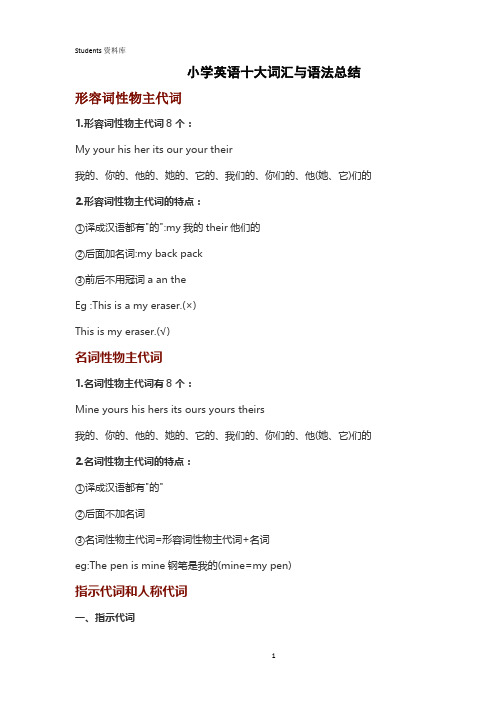
小学英语十大词汇与语法总结形容词性物主代词1.形容词性物主代词8个:My your his her its our your their我的、你的、他的、她的、它的、我们的、你们的、他(她、它)们的2.形容词性物主代词的特点:①译成汉语都有"的":my我的their他们的②后面加名词:my back pack③前后不用冠词a an theEg :This is a my eraser.(×)This is my eraser.(√)名词性物主代词1.名词性物主代词有8个:Mine yours his hers its ours yours theirs我的、你的、他的、她的、它的、我们的、你们的、他(她、它)们的2.名词性物主代词的特点:①译成汉语都有"的"②后面不加名词③名词性物主代词=形容词性物主代词+名词eg:The pen is mine钢笔是我的(mine=my pen)指示代词和人称代词一、指示代词this、that、these、those是指示代词。
these是this的复数形式,指时间、距离较近的或下面要提到的人或事;those是that的复数形式,指时间、距离较远或前面已经提到过的人或事物。
1.近处用this,远处用that-This is a flower.这是一朵花。
(近处)-That is a tree.那是一棵树。
(远处)2.放在一起的两样东西,先说this,后说that-This is a pen,that is a pencil.-这是一支钢笔,那是一支铅笔。
3.向别人介绍某人用This is...,不用That is...-This is Helen.这是海伦.-Helen,this is Tom.海伦,这是汤姆。
4.This is不能缩写,That is可以缩写-This is a bike.That's a car.-这是一辆自行车,那是一辆轿车。
小学三至六年级英语知识点归纳总结
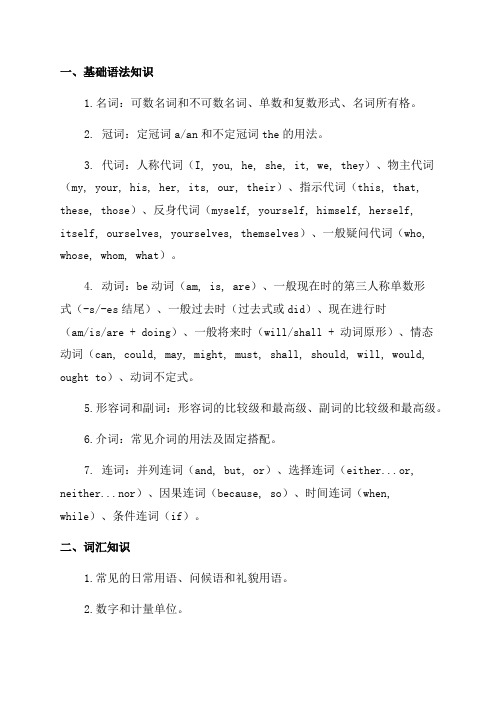
一、基础语法知识1.名词:可数名词和不可数名词、单数和复数形式、名词所有格。
2. 冠词:定冠词a/an和不定冠词the的用法。
3. 代词:人称代词(I, you, he, she, it, we, they)、物主代词(my, your, his, her, its, our, their)、指示代词(this, that, these, those)、反身代词(myself, yourself, himself, herself, itself, ourselves, yourselves, themselves)、一般疑问代词(who, whose, whom, what)。
4. 动词:be动词(am, is, are)、一般现在时的第三人称单数形式(-s/-es结尾)、一般过去时(过去式或did)、现在进行时(am/is/are + doing)、一般将来时(will/shall + 动词原形)、情态动词(can, could, may, might, must, shall, should, will, would, ought to)、动词不定式。
5.形容词和副词:形容词的比较级和最高级、副词的比较级和最高级。
6.介词:常见介词的用法及固定搭配。
7. 连词:并列连词(and, but, or)、选择连词(either...or, neither...nor)、因果连词(because, so)、时间连词(when, while)、条件连词(if)。
二、词汇知识1.常见的日常用语、问候语和礼貌用语。
2.数字和计量单位。
3.季节、天气、时间和日期的词汇。
4.日常生活中的家庭、学校、城市、交通工具等的词汇。
5.常见的动物、植物、水果、蔬菜等的词汇。
6.颜色、形状、大小、方向等的词汇。
7.常见的体育项目、运动用品和运动动作的词汇。
三、阅读和写作技巧1.阅读理解:根据文章内容回答问题、判断正误、选择正确答案等。
(完整版)小学英语语法总结全集
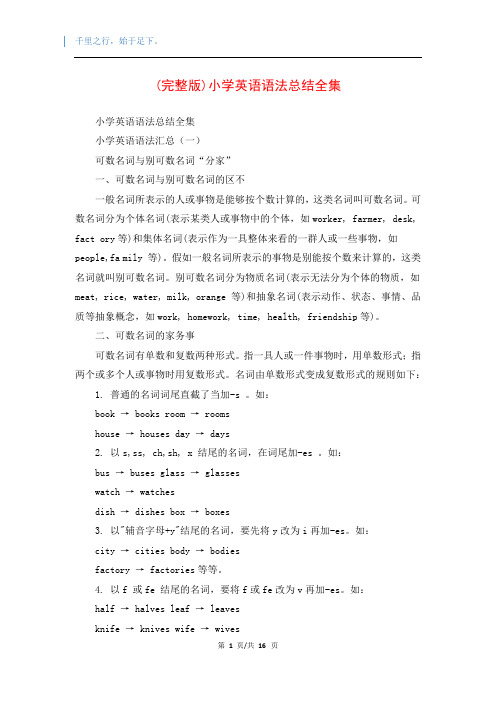
(完整版)小学英语语法总结全集小学英语语法总结全集小学英语语法汇总(一)可数名词与别可数名词“分家”一、可数名词与别可数名词的区不一般名词所表示的人或事物是能够按个数计算的,这类名词叫可数名词。
可数名词分为个体名词(表示某类人或事物中的个体,如worker, farmer, desk, fact ory等)和集体名词(表示作为一具整体来看的一群人或一些事物,如people,fa mily 等)。
假如一般名词所表示的事物是别能按个数来计算的,这类名词就叫别可数名词。
别可数名词分为物质名词(表示无法分为个体的物质,如meat, rice, water, milk, orange 等)和抽象名词(表示动作、状态、事情、品质等抽象概念,如work, homework, time, health, friendship等)。
二、可数名词的家务事可数名词有单数和复数两种形式。
指一具人或一件事物时,用单数形式;指两个或多个人或事物时用复数形式。
名词由单数形式变成复数形式的规则如下: 1. 普通的名词词尾直截了当加-s 。
如:book → books room → roomshouse → houses day → days2. 以s,ss, ch,sh, x 结尾的名词,在词尾加-es 。
如:bus → buses glass → glasseswatch → watchesdish → dishes box → boxes3. 以"辅音字母+y"结尾的名词,要先将y改为i再加-es。
如:city → cities body → bodiesfactory → factories等等。
4. 以f 或fe 结尾的名词,要将f或fe改为v再加-es。
如:half → halves leaf → leavesknife → knives wife → wives5. 特例[悄悄话:特例常常考,要记住。
小学英语语法大全+小学英语单词总汇
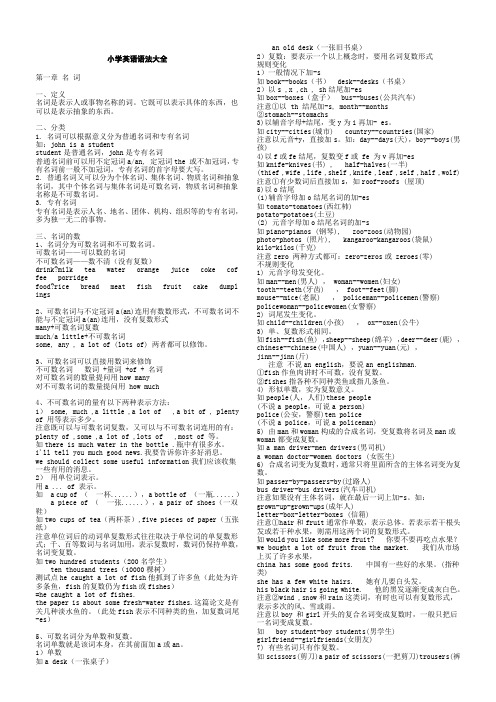
小学英语语法大全第一章名词一、定义名词是表示人或事物名称的词。
它既可以表示具体的东西,也可以是表示抽象的东西。
二、分类1. 名词可以根据意义分为普通名词和专有名词如:john is a studentstudent是普通名词,john是专有名词普通名词前可以用不定冠词a/an, 定冠词the 或不加冠词,专有名词前一般不加冠词,专有名词的首字母要大写。
2. 普通名词又可以分为个体名词、集体名词、物质名词和抽象名词,其中个体名词与集体名词是可数名词,物质名词和抽象名称是不可数名词。
3. 专有名词专有名词是表示人名、地名、团体、机构、组织等的专有名词,多为独一无二的事物。
三、名词的数1、名词分为可数名词和不可数名词。
可数名词——可以数的名词不可数名词——数不清(没有复数)drink?milk tea water orange juice coke coffee p orridgefood?rice bread meat fish fruit cake dumplings 2、可数名词与不定冠词a(an)连用有数数形式,不可数名词不能与不定冠词a(an)连用,没有复数形式many+可数名词复数much/a little+不可数名词some, any , a lot of (lots of) 两者都可以修饰。
3、可数名词可以直接用数词来修饰不可数名词数词 +量词 +of + 名词对可数名词的数量提问用how many对不可数名词的数量提问用 how much4、不可数名词的量有以下两种表示方法:1) some, much ,a little ,a lot of ,a bit of , plenty of 用等表示多少。
注意既可以与可数名词复数,又可以与不可数名词连用的有:plenty of ,some ,a lot of ,lots of ,most of 等。
如there is much water in the bottle .瓶中有很多水。
小学语法总结全集英语(7篇)

1:“first”是序数词,与“the”相连,解释为第一。
2:像“first,term,world”作为词组出现时前面要加“the”。
3:“all”所有;后面的可数名词用复数形式,be动词用“are”。
4:“any”一些;用在否定句和一般疑问句中,与“some”同义。
“some”用在肯定句中。
5:there be+数词,采用“就近原则”。
6:a map of China 与 a map of the world 要牢记。
7:要用“on the wall”,不能用“in the wall”。
门、窗在墙上才能用“in the wall”。
8:can 后+动词原形。
9:play+the+乐器; play+球类;10:like的用法11:动词变动名词形式方法:A--直接在动词后面+ing形式(大多数)。
B--以不发音的“e”结尾的,要去掉e后再+ing,比如:dancing,making,riding。
C--重读be音节,末尾只有一个辅音,须双写末尾的字母后再+ing,如:running,swimmi ng,sitting,putting。
12:现在进行时的构成:be动词+动词ing形式。
标志:now、look、listen、its time to。
13:现在进行时的一般疑问句 /问--be动词+人称+时态(动词ing)答--Yes,he/She/it is/am/are. No,he/She/it isnt/arent/am not.14:用Are you...? Yes,I am/ we are. No,Im not/We arent.15: 动词后+人称宾格形式.16:一般现在时的构成:第三人称单数(三单)。
要注意:后面的动词+s或es。
特例:have→has do→dose go→goes; 标志:often,usually。
17:有些名词变动词时要变形式,例如:teacher→teach;driver→drive.1.一般现在时一般现在时态中,动词一般用原形。
小学英语语法大全(完整版)

小学英语语法大全(完整版)小学英语语法大全第一章:名词一、定义名词是用来表示人或事物名称的词语。
它可以表示具体的事物,也可以表示抽象的概念。
二、分类1.名词可以根据意义分为普通名词和专有名词。
例如,john是一个学生,其中student是普通名词,而john是专有名词。
普通名词前可以用不定冠词a/an,定冠词the或不加冠词,而专有名词前一般不加冠词。
另外,专有名词的首字母要大写。
2.普通名词又可以分为个体名词、集体名词、物质名词和抽象名词。
其中,个体名词和集体名词是可数名词,而物质名词和抽象名词是不可数名词。
3.专有名词专有名词是用来表示人名、地名、团体、机构、组织等的专有名词,多数情况下是独一无二的。
三、名词的数1、名词可以分为可数名词和不可数名词。
可数名词——可以数的名词不可数名词——数不清(没有复数形式)例如:drink(饮料)、milk(牛奶)、tea(茶)、water (水)、orange juice(橙汁)、coke(可乐)、coffee(咖啡)、porridge(粥)、food(食物)、rice(米饭)、bread(面包)、meat(肉类)、fish(鱼)、fruit(水果)、cake (蛋糕)、dumplings(饺子)2、可数名词可以与不定冠词a/an连用,有复数形式。
而不可数名词不能与不定冠词连用,也没有复数形式。
在修饰可数名词时,可以直接使用数词。
而在修饰不可数名词时,需要使用量词。
例如:many+可数名词复数;不可数名词用much/alittle+some/any/a lot of3、不可数名词的数量可以用以下两种方式表示:第一种方式是使用等量词,例如:some、much、a little、a lot of、a bit of、plenty of等。
注意,有些词既可以与可数名词复数连用,也可以与不可数名词连用,例如:plenty of、some、a lot of、lots of、等等。
小学英语语法词汇大全
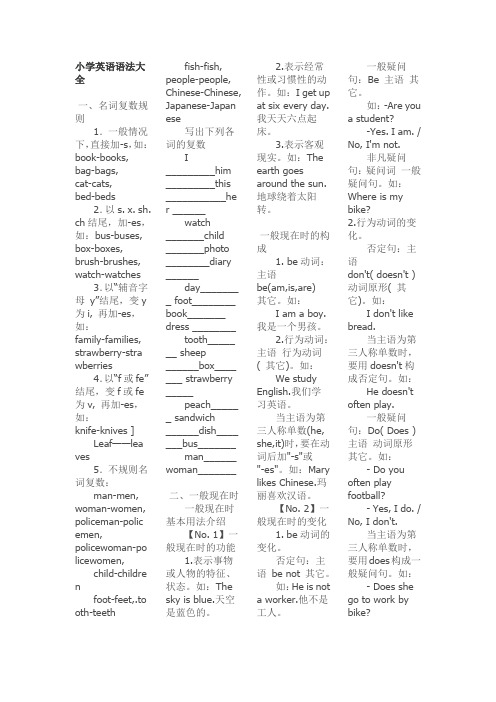
小学英语语法大全一、名词复数规则1.一般情况下,直接加-s,如:book-books, bag-bags,cat-cats,bed-beds2.以s. x. sh. ch结尾,加-es,如:bus-buses, box-boxes, brush-brushes, watch-watches 3.以“辅音字母y”结尾,变y 为i, 再加-es,如:family-families, strawberry-stra wberries4.以“f或fe”结尾,变f或fe 为v, 再加-es,如:knife-knives ]Leaf——lea ves5.不规则名词复数:man-men, woman-women, policeman-polic emen, policewoman-po licewomen,child-childre nfoot-feet,.to oth-teeth fish-fish,people-people,Chinese-Chinese,Japanese-Japanese写出下列各词的复数I_________him_________this___________her ______watch_______child_______photo________diary______day________ foot________book_______dress ________tooth_______ sheep______box_______ strawberry_____peach______ sandwich______dish_______bus_______man______woman_______二、一般现在时一般现在时基本用法介绍【No. 1】一般现在时的功能1.表示事物或人物的特征、状态。
如:Thesky is blue.天空是蓝色的。
2.表示经常性或习惯性的动作。
如:I get upat six every day.我天天六点起床。
小学五。六年级英语语法汇总)
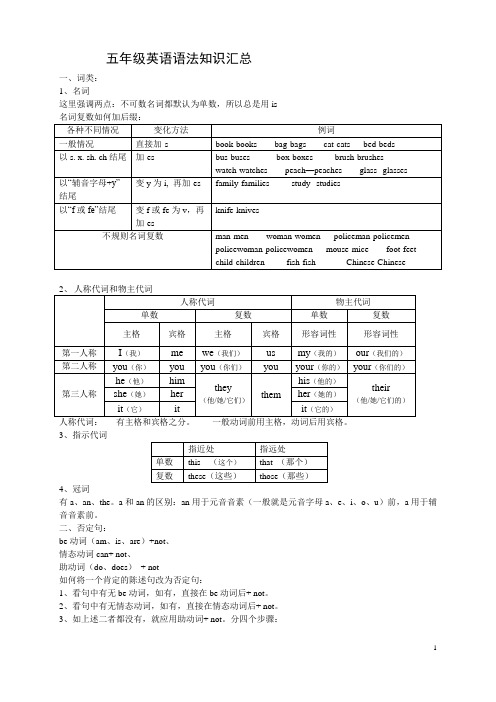
五年级英语语法知识汇总一、词类:1、名词这里强调两点:不可数名词都默认为单数,所以总是用is名词复数如何加后缀:人称代词:有主格和宾格之分。
一般动词前用主格,动词后用宾格。
3、指示代词4、冠词有a、an、the。
a和an的区别:an用于元音音素(一般就是元音字母a、e、i、o、u)前,a用于辅音音素前。
二、否定句:be动词(am、is、are)+not、情态动词can+ not、助动词(do、does)+ not如何将一个肯定的陈述句改为否定句:1、看句中有无be动词,如有,直接在be动词后+ not。
2、看句中有无情态动词,如有,直接在情态动词后+ not。
3、如上述二者都没有,就应用助动词+ not。
分四个步骤:(1)肯定陈述句中本来是没有助动词的,要加上去,位置在主语(某人或某物)后,动词前。
(2)确定助动词用do、does,根据句中动词,动词是原形的助动词就用do,动词是第三人称单数的助动词就用does,(3)在助动词后加not。
(4)原句中动词假如发生变化就要恢复成原形。
强调一点,有some的要考虑是否要用any。
三、一般疑问句。
如何将一个肯定的陈述句改为一般疑问句:1、看句中有无be动词,如有,把be动词提到句首即可。
2、看句中有无情态动词,如有,把情态动词提到句首即可。
3、如上述二者都没有,就应把助动提到句首。
分四个步骤:(1)肯定陈述句中本来是没有助动词的,要加上去,位置在主语(某人或某物)后,动词前。
(2)确定助动词用do还是does,根据句中动词,动词是原形的助动词就用do,动词是第三人称单数的助动词就用does(3)把助动词后提到句首。
(4)原句中动词假如发生变化就要恢复成原形。
强调一点,有some的要考虑是否要用any。
四、特殊疑问句。
表示疑问,有疑问词(在开头),回答有很多种可能。
1、一般现在时(1)一般现在时中的be动词:一般用原形:am is aream用于第一人称单数(I);is用于第三人称单数(he she it和其他人名或称谓,如:Ben his sister 等);are用于第二人称单数(you)和所有复数(包括第一人称复数we、第二人称复数you;第三人称复数they和其他复数,如the children 、his parents等)。
小学英语单词和语法大全
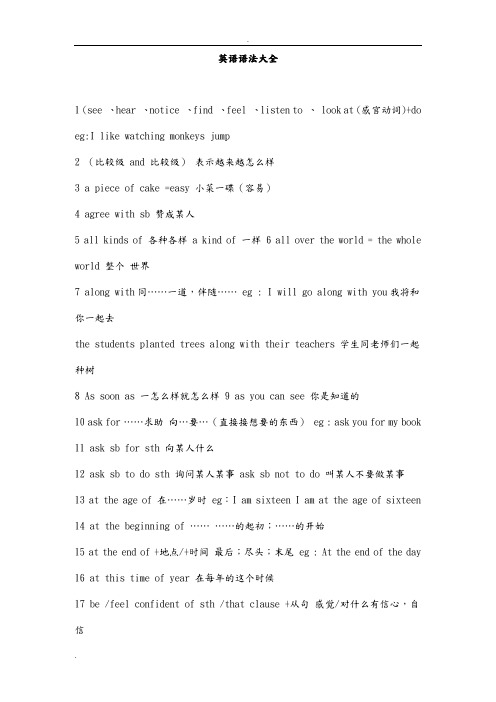
英语语法大全1 (see 、hear 、notice 、find 、feel 、listen to 、 look at (感官动词)+do eg:I like watching monkeys jump2 (比较级 and 比较级)表示越来越怎么样3 a piece of cake =easy 小菜一碟(容易)4 agree with sb 赞成某人5 all kinds of 各种各样 a kind of 一样6 all over the world = the whole world 整个世界7 along with同……一道,伴随…… eg : I will go along with you我将和你一起去the students planted trees along with their teachers 学生同老师们一起种树8 As soon as 一怎么样就怎么样 9 as you can see 你是知道的10 ask for ……求助向…要…(直接接想要的东西) eg : ask you for my book11 ask sb for sth 向某人什么12 ask sb to do sth 询问某人某事 ask sb not to do 叫某人不要做某事13 at the age of 在……岁时 eg:I am sixteen I am at the age of sixteen14 at the beginning of …… ……的起初;……的开始15 at the end of +地点/+时间最后;尽头;末尾 eg : At the end of the day16 at this time of year 在每年的这个时候17 be /feel confident of sth /that clause +从句感觉/对什么有信心,自信eg : I am / feel confident of my spoken English I feel that I can pass the test18 be + doing 表:1 现在进行时 2 将来时19 be able to (+ v 原) = can (+ v 原)能够…… eg : She is able to sing She can sing20 be able to do sth 能够干什么 eg :she is able to sing21 be afraid to do (of sth 恐惧,害怕…… eg : I'm afraed to go out at night I'm afraid of dog22 be allowed to do 被允许做什么eg: I'm allowed to watch TV 我被允许看电视 I should be allowed to watch TV 我应该被允许看电视23 be angry with sb 生某人的气 eg : Don't be angry with me24 be angry with(at) sb for doing sth 为什么而生某人的气25 be as…原级…as 和什么一样 eg : She is as tall as me 她和我一样高26 be ashamed to 27 be away from 远离28 be away from 从……离开29 be bad for 对什么有害 eg : Reading books in the sun is bad for your eyes 在太阳下看书对你的眼睛不好30 be born 出生于31 be busy doing sth 忙于做什么事 be busy with sth 忙于……32 be careful 当心;小心33 be different from…… 和什么不一样34 be famous for 以……著名 35 be friendly to sb 对某人友好36 be from = come from 来自 eg :He is from Bejing He comes from Bejing Is he from Bejing ? Does he come from Bejing ?37 be full of 装满……的 be filled with 充满 eg: the glass is full of water the glass is filled with water38 be glad+to+do/从句 39 be going to + v(原)将来时40 be good at(+doing) = do well in 在某方面善长, 善于……41 be good for 对什么有好处 eg : Reading aloud is good for your English42 be happy to do 很高兴做某事43 be helpful to sb 对某人有好处eg : Reading aloud is helpful to you 大声朗读对你有好处Exercising is helpful to your bady 锻炼对你的身体有好处44 be in good health 身体健康45 be in trouble 处于困难中 eg : She is in trouble They are in tronble46 be interested in 对某方面感兴趣47 be late for = come late to 迟到 eg: Be late for class 上课迟到48 be like 像…… eg : I'm like my mother49 be mad at 生某人的气50 be made from 由……制成(制成以后看不见原材料)51 be made of 由……制成(制成以后还看得见原材料) 52 be not sure 表不确定53 be on a visit to 参观 54 be popular with sb 受某人欢迎55 be quiet 安静 56 be short for 表**的缩写 eg: is short for 俊杰57 be sick in bed 生病在床 58 be sorry to do sth be sorry for sb eg : I am sorry for you59 be sorry to hear that 60 be sorry to trouble sb eg : I am sorry to trouble you61 be strict in doing sth 严于做某事 eg : He's strict in obeying noles62 be strict with sb 对某人要求严格 eg: Some students are not strict with them selves 这些学生对自己不严格63 be strict with sb in sth 某方面对某人严格 64 be supposed to do 被要求干什么65 be sure 表确定 66 be sure of doing sth 对做某事有信心 eg: He is sure of winning I am sure of learning English well67 be sure of sth 对做某事有信心 eg: I'm sure of my head (my teacher 我相信我的大脑(老师)68 be sure that sth 对做某事有信心 eg: I'm suer that he can pass the test 我相信他能通过考试69 be sure to do sth一定会做某事eg: We are sure to pass the test 我们一定会通过这次考试 We are sure to learn English well 我们一定能学好英语70 be terrified of + 名/动doing 害怕…… 71 be terrified to do sth 害怕做某事72 be the same as … 和什么一样 73 be used to doing sth 习惯做某事eg: My father is used to getting up early 我爸爸习惯早He is used to sleeping in class 他习惯上课睡觉74 be worth doing 值得做什么 75 be(feel) afraid to do sth 害怕做某事be afraid of sth 害怕某物 be afraid that 丛句76 because+句子 because of +短语eg : He was late because he had a headache He was late because of his headache77 begin to do = start to do 开始做某事start…with…=begin…with… 以什么开始什么eg : Let's begin the game with the song I begin to go home78 between…and… 两者之间79 borrow sth from sb 向……借…… lend sth to sb ( lend sb sth 借给……什么东西eg : I borrowed a pen from him he lent a pen to me ( he lent me a pen80 both = the same(as) = not different(from) 表相同81 bother 打扰 bother sb to do stheg : I'm sorry to bother you ,but can you tell me to way to the station 我十分道歉打扰你,但是你能告诉我怎么去车站the problem has been bothering me for weeks 这个问题困扰了我几个周了He's bothering me to lend him money82 by the end of 到……为止 83 call sb sth eg : We call him old wang 84 care 关心 eg : Don't you care about this country's future ?你为什么不关心国家的未来85 catch up with sb 赶上某人 86 chat with sb 和某人闲谈 take sb to + 地点带某人去某地87 come in 进88 come over to 过来89 come up with 提出 eg: Can you come up with a good idea 你能想出一个好办法吗?90 communicate with sb 和某人交流91 consider + doing 考虑做什么 eg : Why not consider going to lu zhou 为什么不考虑去?92 dance to 随着……跳舞 eg : She likes dancing to the music 她喜欢随着音乐跳舞93 decide to do sth 决定做某事 94 do a survey of 做某方面的调查 95 do better in 在……方面做得更好96 do wrong 做错 97 Don't forget to do sth 不要忘了做某事 98 Don't mind +doing /从句 /名词不要介意……99 each +名(单)每一个…eg : Each student has many books 每一个学生都有一些书 100 end up +doing 101 enjoy +doing喜欢 102 escape from 从……逃跑eg: The prisoners have escaped from the prison犯人从监狱里逃跑出来 103 expect to do sth 期待做某事 104 fall down 摔下来 fall off 从哪摔下来 105 fall in love with sb /sth 爱上什么106 far from 离某地远 eg : The school is far from my home 107 find +it +adj +to do 发现做某事怎么样108 find sb/sth +adj 发现什么怎么样 eg : I find the book interesting 109 finish 完成+doing(名词)110 fit to sb = be fit for sb 适合某人 111 forget to do 没有做而忘了forget doing 做了而又忘了 eg: Don't forget to go home I forget closing door 112 from…to… 从某某到某某 eg: From me for her113 get /have sth down 做完,被(别人)做…eg: I have my hair cut 我理了发(头发被剪了)Tom got his bad tooth pulled out 汤母把他的坏牙拔掉了(被牙医拔掉了)114 get a part-time job= find a part-time job 115 get along well with sb = get on well with sb 与某人相处得好116 get along with sb = get on with sb 与某人相处 117 get ready for = be ready for为什么而准备eg : I get ready for math I am ready for math 118 get sb in to trouble 给某人麻119 get sb to do sth120 get…from… 从某处得到某物 121 give a talk 做报告 eg: He is give a tall122 give sth to sb give sb sth 给某人某物 123 go fish 钓鱼 go swimming 游泳124 go on to do 去做下一件事 go on doing 继续做这件事 125 go out away from go out of126 go to school 上学(用于专业的)go to the school 去学校(不一定是上学) 127 good way to 好方法128 hate to do 讨厌没做过的事 hate doing 讨厌做过的事129 have a party for sb 举办谁的晚会 130 have a talk 听报告谈一谈131 have been doing 现在完成进行时 eg : You have been talking You have been sleeping since132 have been to …( 地方)……去过某过地方 have gone to …(地方)去了某地还没回来133 have fun +doing 玩得高兴 134 have sth to do 有什么事要做eg: I have a lot of homework to do 我有很多家庭作业要做 I have nothing to do 我没什么事情做135 have to do sth 必须做某事136 have trouble (problem) (in) doing sth 做什么事情有麻烦137 have…time +doing138 have…(时间)…off 放……假 eg: I have month off 我请一个月得假139 hear sb +do/doing 听见某人做某事/正在做某事140 help a lot 很大用处141 help sb with sth \one's sth 帮助某人某事(某方面) help sb (to) do sth 帮助某人做某事142 hope to do sth 希望做某事143 How about(+doing) = What about(+doing)144 how do you like = what do you think of 你对什么的看法145 if : 是否=wethereg: I don't know if (wether) I should go to the party 我不知道我是否应该去参加晚会He don't know if (wether) we will arrive on time tomorrow morning 他不知道我们明天早上是否能准时到达146 if :如果,假如(全部接一般时态)+条件语态从句eg: I'll go to LuZhou if it does't rain 假如明天不下雨,我就去If they change the plan they will let me know 假如他们要改变计划,他们会让我知道的I'll go to England ,if I have enough money next year 如果我明年由足够的钱,我就要去英国147 in one's opinion = sb think 某人认为148 in some ways 在某些方面149 in the end = finally(adv) 最后150 in the north of… 什么在什么的北方(north 北 sowth 南 west 西 east 东)一、名词复数规则1.一般情况下,直接加-s,如:book-books, bag-bags, cat-cats,bed-beds2.以s. x. sh. ch结尾,加-es,如:bus-buses, box-boxes, brush-brushes, watch-watches3.以“辅音字母 y”结尾,变y为i, 再加-es,如:family-families, strawberry-strawberries4.以“f或fe”结尾,变f或fe为v, 再加-es,如:knife-knives ] Leaf——leaves5.不规则名词复数:man-men, woman-women, policeman-policemen,policewoman-policewomen,child-childrenfoot-feet,.tooth-teethfish-fish, people-people, Chinese-Chinese, Japanese-Japanese二、一般现在时一般现在时基本用法介绍【No. 1】一般现在时的功能1.表示事物或人物的特征、状态。
小学英语常用语法归纳(六年级复习专用)

语法归纳1.不可数名词:bread, juice, tea, coffee, water, chocolate, rice, paper(不可数名词都默认为单数,所以总是用is或者was;不要根据some、any、a lot of等词去作判断,以免受误导。
) 2.不规则名词复数:man ---men, woman---women, policeman---policemen, policewoman---policewomen, mouse---mice child---children foot---feet, .tooth---teeth fish---fish, people---people, Chinese---Chinese, Japanese---Japanese3.动词/介词+宾格(me/us/you/him/her/them/it)4. 形容词性物主代词(my/our/your/his/her/their/its)后面必须要跟名词。
名词性物主代词(mine/ours/yours/his/hers/theirs/its)后面不要跟名词。
5. 比较级+than/……,A or B?as+原级as too/very+原级6.形容词一般形容事物(形容词见知识集锦65页)副词一般形容动词(副词见知识集锦66页)7.序数词前一定要加―the‖,序数词一般用于:①日期【the 号(序数词)of 月】②【第几…】③【名次】8.助动词(do/does/did)+动词原形 to+动词原形情态动词(can/may/must/should/would/shall)+动词原形①in + 月、年the morning/afternoon/evening/a week9.表示时间②on + 具体某一天(几月几日)/某个假期(…Day)③at + 具体某点时间、某个假期(…Festival)/the weekend①in…street10.表示方位②on…road/left/right③at the…crossing/stop/某个具体的地点11. ①in the tree(不是树上长出来的) 12. play the +乐器13.want to +动词原形②on the tree(树上原来自己长出来的) play+球类运动would like to +动词原形14. 表示时间:①ago(……以前) later(……以后) 15.be good at 名词原形②before (在……以前) after(在……以后) 动词+ing16.like+ 名词复数17. with 长在身上的,拿在手里的18.on the plate 在盘子里动词+ing in 穿在身上的19.touch …with… 用……触摸……20. feel + 感觉感觉…21.in the classroom 在教室里I’ve got + 病、物体我得了…,我有… in class 在课堂上24.the same +名词单数25. 分≤30分分 past 小时半个小时=30分=halfdifferent+名词复数分﹥30分60-分to 小时+1 1刻=15分=a quarter26.open /close+直接可以打开得物体turn on/ turn off +开关、电器27.It’s time to +动词原形28. look for 寻找(强调过程)for+名词find 找到(强调结果)29.watch TV/cartoons/…race/…game/…match 观看(电视/卡通/…比赛)30. take off 脱下see 看到(人物/物体) put on 穿上look for 寻找/ look like 看起来像/ look after 照看,照顾/ look at 看31.There be 句型表示:在某地有某物(或人) have、has、had表示:某人拥有某物。
小学英语单词、语法大全

小学英语单词、语法大全一、学习用品 (school things)pen钢笔 pencil铅笔 pencil-case铅笔盒 ruler尺子 book书bag包 comic book漫画书 post card明信片 newspaper报纸 schoolbag书包 eraser橡皮 crayon蜡笔 sharpener卷笔刀 story-book故事书 notebook 笔记本 Chinese book语文书English book英语书 math book数学书 magazine杂志dictionary词典对学习用品提问用what,如:This is a book.(提问)→What is this?(注意:当对名词提问时,a/an在句中已无意义,所以要省去。
)二、人体(body)foot脚 head头 face脸 hair头发 nose鼻子 mouth嘴eye眼睛 ear耳朵 arm手臂 hand手 finger手指 leg腿tail尾巴 shoulder 肩膀 knee 膝盖 toe 脚趾三、颜色(colours)red红 blue蓝 yellow黄 green绿 white白 black黑 pink粉红 purple紫orange橙 brown棕对颜色提问用what colour,如:It’s red.(提问)→What colour is it?四、动物(animals)cat猫 dog狗 pig猪 duck鸭 rabbit兔 horse马 elephant大象ant蚂蚁fish鱼 bird鸟 eagle鹰 beaver海狸 snake蛇 mouse老鼠 squirrel松鼠kangaroo袋鼠 monkey猴 panda熊猫 bear熊 lion狮子 tiger老虎 fox狐狸 zebra斑马 deer鹿 giraffe长颈鹿 goose鹅 hen母鸡 turkey火鸡 lamb 小羊sheep绵羊 goat山羊 cow奶牛 donkey驴 squid鱿鱼 lobster龙虾shark鲨鱼 seal海豹 sperm whale抹香鲸 killer whale虎鲸对动物名词提问用what,如:It’s a dog.(提问)→What is it?My favourite animal is a dog.(提问)→What’s your favourite animal?I like dogs best.(提问)→Which animal do you like best?(对like后的名词提问,也就是对这种名词所属类别的一种提问,所以要用which +类别词做疑问词。
英语常用单词和语法

英语常用单词和语法一、常用单词。
1. 名词(n.)- book[bʊk]:书籍。
例如:I have a book.(我有一本书。
)- desk[desk]:书桌。
The book is on the desk.(书在书桌上。
)- teacher['tiːtʃə(r)]:教师。
Our teacher is very kind.(我们的老师很和蔼。
)2. 动词(v.)- run[rʌn]:跑。
He likes to run in the morning.(他喜欢在早晨跑步。
)- eat[iːt]:吃。
We eat breakfast at 7:00.(我们7点吃早饭。
)- go[ɡəʊ]:去。
Let's go to school.(让我们去上学。
)3. 形容词(adj.)- big[bɪɡ]:大的。
This is a big house.(这是一个大房子。
)- small[smɔːl]:小的。
The cat is small.(这只猫很小。
)- happy['hæpi]:高兴的。
She is a happy girl.(她是一个快乐的女孩。
)4. 副词(adv.)- quickly['kwɪkli]:快速地。
He runs quickly.(他跑得很快。
)- slowly['sləʊli]:缓慢地。
The old man walks slowly.(这位老人走得很慢。
)- here[hɪə(r)]:这里。
Come here, please.(请到这里来。
)二、常用语法。
1. 一般现在时。
- 概念:表示经常发生的动作或存在的状态。
- 结构:- 主语(非第三人称单数)+动词原形+其他。
例如:I like apples.(我喜欢苹果。
)- 主语(第三人称单数)+动词第三人称单数形式(通常在动词原形后加 -s或 -es)+其他。
例如:He likes apples.(他喜欢苹果。
- 1、下载文档前请自行甄别文档内容的完整性,平台不提供额外的编辑、内容补充、找答案等附加服务。
- 2、"仅部分预览"的文档,不可在线预览部分如存在完整性等问题,可反馈申请退款(可完整预览的文档不适用该条件!)。
- 3、如文档侵犯您的权益,请联系客服反馈,我们会尽快为您处理(人工客服工作时间:9:00-18:30)。
英语语法大全1 (see 、hear 、notice 、find 、feel 、listen to 、look at (感官动词)+do eg:I like watching monkeys jump2 (比较级and 比较级)表示越来越怎么样3 a piece of cake =easy 小菜一碟(容易)4 agree with sb 赞成某人5 all kinds of 各种各样a kind of 一样6 all over the world = the whole world 整个世界7 along with同……一道,伴随…… eg : I will go along with you我将和你一起去the students planted trees along with their teachers 学生同老师们一起种树8 As soon as 一怎么样就怎么样9 as you can see 你是知道的10 ask for ……求助向…要…(直接接想要的东西)eg : ask you for my book11 ask sb for sth 向某人什么12 ask sb to do sth 询问某人某事ask sb not to do 叫某人不要做某事13 at the age of 在……岁时eg:I am sixteen I am at the age of sixteen14 at the beginning of …………的起初;……的开始15 at the end of +地点/+时间最后;尽头;末尾eg : At the end of the day16 at this time of year 在每年的这个时候17 be /feel confident of sth /that clause +从句感觉/对什么有信心,自信eg : I am / feel confident of my spoken English I feel that I can pass the test18 be + doing 表:1 现在进行时2 将来时19 be able to (+ v 原) = can (+ v 原)能够…… eg : She is able to sing She can sing20 be able to do sth 能够干什么eg :she is able to sing21 be afraid to do (of sth 恐惧,害怕…… eg : I'm afraed to go out at night I'm afraid of dog22 be allowed to do 被允许做什么eg: I'm allowed to watch TV 我被允许看电视I should be allowed to watch TV 我应该被允许看电视23 be angry with sb 生某人的气eg : Don't be angry with me24 be angry with(at) sb for doing sth 为什么而生某人的气25 be as…原级…as 和什么一样eg : She is as tall as me 她和我一样高26 be ashamed to 27 be away from 远离28 be away from 从……离开29 be bad for 对什么有害eg : Reading books in the sun is bad for your eyes 在太阳下看书对你的眼睛不好30 be born 出生于31 be busy doing sth 忙于做什么事be busy with sth 忙于……32 be careful 当心;小心33 be different from……和什么不一样34 be famous for 以……著名35 be friendly to sb 对某人友好36 be from = come from 来自eg :He is from Bejing He comes from Bejing Is he from Bejing ? Does he come from Bejing ?37 be full of 装满……的be filled with 充满eg: the glass is full of water the glass is filled with water38 be glad+to+do/从句39 be going to + v(原)将来时40 be good at(+doing) = do well in 在某方面善长, 善于……41 be good for 对什么有好处eg : Reading aloud is good for your English42 be happy to do 很高兴做某事43 be helpful to sb 对某人有好处eg : Reading aloud is helpful to you 大声朗读对你有好处Exercising is helpful to your bady 锻炼对你的身体有好处44 be in good health 身体健康45 be in trouble 处于困难中eg : She is in trouble They are in tronble46 be interested in 对某方面感兴趣47 be late for = come late to 迟到eg: Be late for class 上课迟到48 be like 像…… eg : I'm like my mother49 be mad at 生某人的气50 be made from 由……制成(制成以后看不见原材料)51 be made of 由……制成(制成以后还看得见原材料) 52 be not sure 表不确定53 be on a visit to 参观54 be popular with sb 受某人欢迎55 be quiet 安静56 be short for 表**的缩写eg: 陶is short for 陶俊杰57 be sick in bed 生病在床58 be sorry to do sth be sorry for sb eg : I am sorry for you59 be sorry to hear that 60 be sorry to trouble sb eg : I am sorry to trouble you61 be strict in doing sth 严于做某事eg : He's strict in obeying noles62 be strict with sb 对某人要求严格eg: Some students are not strict with them selves 这些学生对自己不严格63 be strict with sb in sth 某方面对某人严格64 be supposed to do 被要求干什么65 be sure 表确定66 be sure of doing sth 对做某事有信心eg: He is sure of winning I am sure of learning English well67 be sure of sth 对做某事有信心eg: I'm sure of my head (my teacher 我相信我的大脑(老师)68 be sure that sth 对做某事有信心eg: I'm suer that he can pass the test 我相信他能通过考试69 be sure to do sth一定会做某事eg: We are sure to pass the test 我们一定会通过这次考试We are sure to learn English well 我们一定能学好英语70 be terrified of + 名/动doing 害怕…… 71 be terrified to do sth 害怕做某事72 be the same as …和什么一样73 be used to doing sth 习惯做某事eg: My father is used to getting up early 我爸爸习惯早He is used to sleeping in class 他习惯上课睡觉74 be worth doing 值得做什么75 be(feel) afraid to do sth 害怕做某事be afraid of sth 害怕某物be afraid that 丛句76 because+句子because of +短语eg : He was late because he had a headache He was late because of his headache77 begin to do = start to do 开始做某事start…with…=begin…with…以什么开始什么eg : Let's begin the game with the song I begin to go home78 between…and…两者之间79 borrow sth from sb 向……借…… lend sth to sb ( lend sb sth 借给……什么东西eg : I borrowed a pen from him he lent a pen to me ( he lent me a pen80 both = the same(as) = not different(from) 表相同81 bother 打扰bother sb to do stheg : I'm sorry to bother you ,but can you tell me to way to the station我十分道歉打扰你,但是你能告诉我怎么去车站the problem has been bothering me for weeks 这个问题困扰了我几个周了He's bothering me to lend him money82 by the end of 到……为止83 call sb sth eg : We call him old wang84 care 关心eg : Don't you care about this country's future ?你为什么不关心国家的未来85 catch up with sb 赶上某人86 chat with sb 和某人闲谈take sb to + 地点带某人去某地87 come in 进88 come over to 过来89 come up with 提出eg: Can you come up with a good idea 你能想出一个好办法吗?90 communicate with sb 和某人交流91 consider + doing 考虑做什么eg : Why not consider going to lu zhou 为什么不考虑去泸州?92 dance to 随着……跳舞eg : She likes dancing to the music 她喜欢随着音乐跳舞93 decide to do sth 决定做某事94 do a survey of 做某方面的调查95 do better in 在……方面做得更好96 do wrong 做错97 Don't forget to do sth 不要忘了做某事98 Don't mind+doing /从句/名词不要介意……99 each +名(单)每一个…eg : Each student has many books 每一个学生都有一些书100 end up +doing 101 enjoy +doing喜欢102 escape from 从……逃跑eg: The prisoners have escaped from the prison犯人从监狱里逃跑出来103 expect to do sth 期待做某事104 fall down 摔下来fall off 从哪摔下来105 fall in love with sb /sth 爱上什么106 far from 离某地远eg : The school is far from my home 107 find +it +adj +to do 发现做某事怎么样108 find sb/sth +adj 发现什么怎么样eg : I find the book interesting 109 finish 完成+doing(名词)110 fit to sb = be fit for sb 适合某人111 forget to do 没有做而忘了forget doing 做了而又忘了eg: Don't forget to go home I forget closing door 112 from…to…从某某到某某eg: From me for her113 get /have sth down 做完,被(别人)做…eg: I have my hair cut 我理了发(头发被剪了)Tom got his bad tooth pulled out 汤母把他的坏牙拔掉了(被牙医拔掉了)114 get a part-time job= find a part-time job 115 get along well with sb = get on well with sb 与某人相处得好116 get along with sb = get on with sb 与某人相处117 get ready for = be ready for 为什么而准备eg : I get ready for math I am ready for math 118 get sb in to trouble 给某人麻119 get sb to do sth120 get…from…从某处得到某物121 give a talk 做报告eg: He is give a tall122 give sth to sb give sb sth 给某人某物123 go fish 钓鱼go swimming 游泳124 go on to do 去做下一件事go on doing 继续做这件事125 go out away from go out of126 go to school 上学(用于专业的)go to the school 去学校(不一定是上学)127 good way to 好方法128 hate to do 讨厌没做过的事hate doing 讨厌做过的事129 have a party for sb 举办谁的晚会130 have a talk 听报告谈一谈131 have been doing 现在完成进行时eg : You have been talking You have been sleeping since132 have been to …( 地方)……去过某过地方have gone to …(地方)去了某地还没回来133 have fun +doing 玩得高兴134 have sth to do 有什么事要做eg: I have a lot of homework to do 我有很多家庭作业要做I have nothing to do 我没什么事情做135 have to do sth 必须做某事136 have trouble (problem) (in) doing sth 做什么事情有麻烦137 have…time +doing138 have…(时间)…off 放……假eg: I have month off 我请一个月得假139 hear sb +do/doing 听见某人做某事/正在做某事140 help a lot 很大用处141 help sb with sth \one's sth 帮助某人某事(某方面)help sb (to) do sth 帮助某人做某事142 hope to do sth 希望做某事143 How about(+doing) = What about(+doing)144 how do you like = what do you think of 你对什么的看法145 if : 是否=wethereg: I don't know if (wether) I should go to the party 我不知道我是否应该去参加晚会He don't know if (wether) we will arrive on time tomorrow morning 他不知道我们明天早上是否能准时到达146 if :如果,假如(全部接一般时态)+条件语态从句eg: I'll go to LuZhou if it does't rain 假如明天不下雨,我就去泸州If they change the plan they will let me know 假如他们要改变计划,他们会让我知道的I'll go to England ,if I have enough money next year 如果我明年由足够的钱,我就要去英国147 in one's opinion = sb think 某人认为148 in some ways 在某些方面149 in the end = finally(adv) 最后150 in the north of…什么在什么的北方(north 北sowth 南west 西east 东)一、名词复数规则1.一般情况下,直接加-s,如:book-books, bag-bags, cat-cats, bed-beds2.以s. x. sh. ch结尾,加-es,如:bus-buses, box-boxes, brush-brushes, watch-watches3.以“辅音字母y”结尾,变y为i, 再加-es,如:family-families, strawberry-strawberries4.以“f或fe”结尾,变f或fe为v, 再加-es,如:knife-knives ]Leaf——leaves5.不规则名词复数:man-men, woman-women, policeman-policemen, policewoman-policewomen, child-childrenfoot-feet,.tooth-teethfish-fish, people-people, Chinese-Chinese, Japanese-Japanese二、一般现在时一般现在时基本用法介绍【No. 1】一般现在时的功能1.表示事物或人物的特征、状态。
